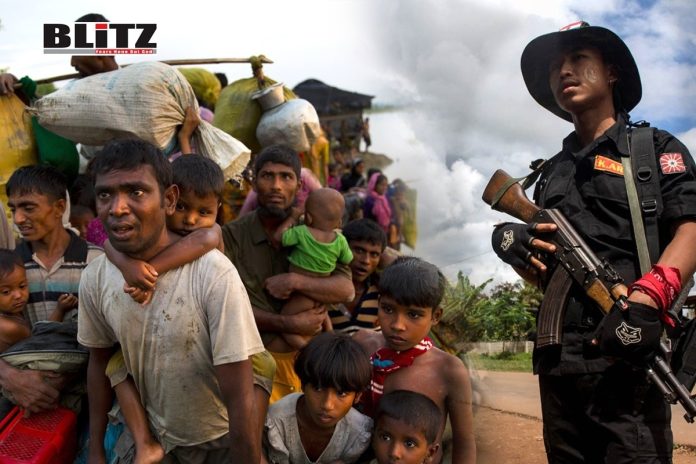The United Nations (UN) is at a pivotal moment, facing an urgent need for decisive action to tackle the worsening crisis in Myanmar. The Security Council’s meeting on April 4 highlighted the critical nature of the situation, serving as a clear wake-up call. However, it also emphasized the international community’s shortcomings in effectively addressing this escalating humanitarian disaster. Immediate and substantial action is not just advisable but essential to alleviate the suffering and stabilize the situation in Myanmar.
Myanmar is currently in the throes of a severe crisis, firmly held in the clutches of a brutal junta that has ushered in chaos and violence. This regime’s merciless crackdown on civilians, characterized by airstrikes and blocking essential humanitarian aid, has intensified an already desperate situation. Countless innocent individuals are being uprooted from their homes, forced to seek safety across borders in neighboring countries like Bangladesh, China, India, and Thailand. Among these displaced populations, the Rohingya people find themselves in especially dire straits, undertaking perilous sea voyages in search of refuge from the violence and persecution they face at home.
Despite the gravity of the situation, the response from the UN Security Council has fallen short. While the Human Rights Council passed resolutions calling for restrictions on the Myanmar military’s access to resources, such measures are insufficient. The failure to take decisive action sends a troubling message to perpetrators of violence and undermines the credibility of the UN as a global peacekeeper.
The consequences of inaction are dire. Without urgent intervention, Myanmar is poised to descend further into chaos. The junta’s desperation to maintain power has led to forced conscription, particularly targeting minority groups such as the Rohingya, who are denied citizenship rights. This aggressive military stance has resulted in widespread desertions and defections, further destabilizing the region.
Recent developments, like the strategic towns falling under the control of ethnic armed factions, underscore the military regime’s vulnerability. Consequently, the junta has ramped up its strategies, enforcing compulsory conscription and escalating violence against minority communities, notably targeting the Rohingya population. These actions depict a regime resorting to increasingly aggressive measures to maintain its grip on power amidst growing internal challenges.
It is imperative that the UN, in collaboration with regional bodies like the Association of Southeast Asian Nations (ASEAN), takes immediate and decisive action. This includes imposing targeted sanctions, restricting arms sales, and intensifying diplomatic pressure on the junta to cease its violent crackdown and engage in meaningful dialogue with all stakeholders.
However, the burden of addressing the crisis extends beyond the UN; ASEAN’s reaction has also fallen short. Despite its professed dedication to peace and stability, ASEAN has not effectively tackled the severe human rights abuses and humanitarian emergencies within its member states. The Rohingya genocide laid bare ASEAN’s hesitancy to intervene in what it views as domestic matters, choosing to prioritize state sovereignty over the pressing human rights concerns, thereby undermining its commitment to upholding universal values and protections.
ASEAN’s decision-making process, which relies on consensus among member states, has impeded its capacity to take firm action regarding Myanmar. Some member states, closely aligned with the junta, have thwarted attempts to implement substantial sanctions or apply pressure on the regime to halt its oppressive measures against dissenting voices.
The shortcomings of both the UN and ASEAN in addressing Myanmar’s crisis accentuate the challenges regional organizations face in managing intricate humanitarian crises. This underscores the pressing need for enhanced international collaboration and accountability mechanisms. Such collaboration is vital for safeguarding human rights and preventing large-scale atrocities, emphasizing the necessity for a unified global response to uphold these fundamental values and address the crisis effectively.
The international community faces a pressing obligation to prioritize the safeguarding of civilians in Myanmar. It is crucial to ensure unhindered access to humanitarian aid and to actively support initiatives that address the underlying causes of conflict and displacement. Without prompt and decisive action, the plight of innocent civilians will persist, fueling further violence and instability across the region.
The UNSC’s meeting on April 4 represented a missed opportunity to confront the deepening crisis in Myanmar head-on. The urgency of the situation demands that the international community unites with a sense of purpose and resolve. Immediate and meaningful action is required to shield the lives and rights of Myanmar’s people, averting any further escalation of violence and humanitarian distress. It is incumbent upon global leaders to act swiftly and decisively to mitigate the suffering and work towards a sustainable resolution for the benefit of all affected communities.
The situation in Myanmar urgently requires unified and prompt action from the global community. Both the UN and ASEAN must transcend their limitations, collaborate effectively, and tackle the fundamental issues causing the crisis. Their collective efforts should prioritize the protection of civilians and the preservation of human rights. The window for effective intervention is narrowing; action must be taken immediately to prevent further escalation and irreversible harm.




